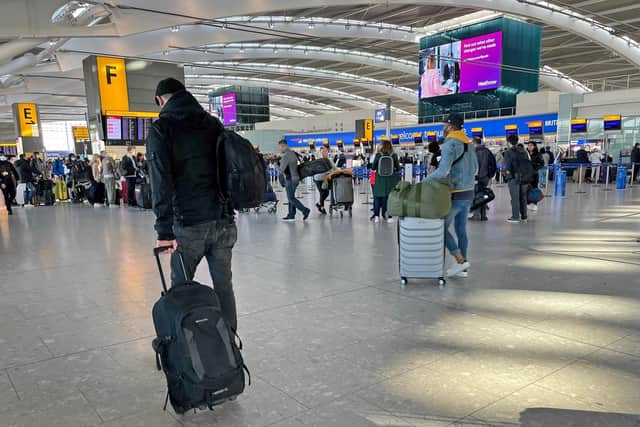Take your time and tell travel insurers everything about your health - Sarah Coles
The third was booked last weekend, more in hope than in expectation, and the very first thing I bought was the travel insurance.
It’s an essential part of planning any break – even more so now that the world is getting less predictable by the day – but you need to be very careful, both about the insurance you buy and the other steps you take to protect yourself.
Advertisement
Hide AdAdvertisement
Hide AdI spent much longer choosing my insurance than I eventually did picking a hotel. One key area was the detail on coronavirus cover. It varies significantly between policies, so it’s essential to completely understand what you need, and what’s on offer.


Most will cover you for medical expenses if you get Covid while you’re away, if you test positive before you’re meant to be travelling, or if rules change while you’re away which mean you’re forced to return home.
You’re unlikely to be covered by any policy if you don’t want to travel because you don’t feel safe, because quarantine rules have been introduced and you don’t want to follow them, or if some amenities are closed at your hotel because of the virus.
However, some aspects vary, so you’ll need to check your policy in detail.
Advertisement
Hide AdAdvertisement
Hide AdWhen you’re looking through the small print, bear in mind that you won’t get cover for absolutely every eventuality, but you need to be sure you’re happy with what you’re paying for, and that you understand the circumstances when you’ll be left out of pocket.
I also spent far longer than normal working out what would happen in the event of a more widespread conflict. If you’re planning a holiday to any country involved in the Ukraine conflict, the bad news is that travel insurance usually excludes cover for acts of war, so you won’t get any money back from your insurer.
If the Foreign Office recommends you don’t travel to these countries, then if you choose to travel, your insurance will be invalidated too. Right now Russia, Belarus and Ukraine are on that particular list.
I also took my time with the pre-existing medical conditions.
Advertisement
Hide AdAdvertisement
Hide AdWe have a fair few of these in my family, and while none of us have been admitted to hospital for any of them, that’s not the point.
If something was to happen to you, insurers will look for even the slightest sign on your medical records that this could be a problem.
Decades ago, I cancelled a holiday after my mum was diagnosed with end stage oesophageal cancer, and the insurer refused to pay out on the grounds she had seen the GP about acid reflux.
Don’t assume that your condition is too minor to count. You’d be surprised at the things you need to disclose, from allergies and asthma to depression and anxiety, and recent accidents and injuries: take your time and tell them everything.
Advertisement
Hide AdAdvertisement
Hide AdOnce I’d bought my insurance, I would usually go straight to a travel agent. It sounds old-school, but I use a freelance online agent, who can pull together flights and accommodation from any firm.
She knows all the tricks to cutting the cost of the trip – from where to stay to when to book – and can always track down a better bargain than I can find myself.
One big advantage of using an agent is that they will stay in touch with any changes in the Covid rules, and help make sure you have completed all the vital paperwork and jumped through all the hoops in order to travel.
The other major attraction is that if you pick a company with Atol protection, and book more than one element of your package through them, you’ll have more protection if your airline or hotel goes under.
Advertisement
Hide AdAdvertisement
Hide AdThis time round, my agent was on maternity leave, so I booked flights and accommodation myself. I used a hotel booking website, so I had an added level of protection if the hotel doesn’t turn out to be everything it seems. I also paid a bit more for a fully refundable tariff.
I also booked both the hotel and the flights with a credit card. Section 75 of the consumer credit act means that because I spent between £100 and £30,000, the credit card company is equally liable with the airline and hotel. If either goes bust, I can go back to my credit card company for a refund.
It’s worth highlighting that it only covers the things the company itself has control over. So, for example, if you’re unable to make it to your hotel because your airline goes under, then even if you booked both by credit card, you wouldn’t get the accommodation costs back.
Even with all these things in place, there are no guarantees. Out of all the holidays that I’ve ever had to cancel, I haven’t ever had a full refund on any of them.
Advertisement
Hide AdAdvertisement
Hide AdThe process of booking a holiday involves taking every step you can in order to protect yourself – while being aware that with so much uncertainty in the world, you could still find yourself paying a fortune for the privilege of staying home.
It’s almost enough to put you off entirely, but if I’m still giving it a bash after such an impressive run of bad luck, then anyone can.
By Sarah Coles · Senior Personal Finance Analyst at Hargreaves Lansdown
